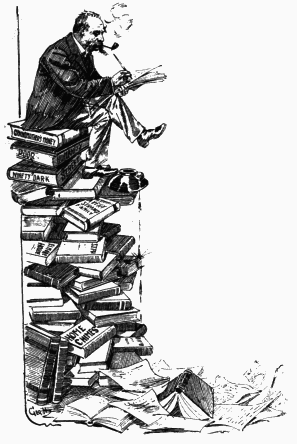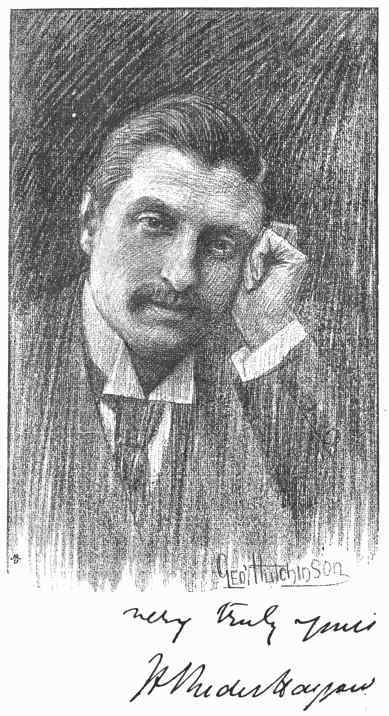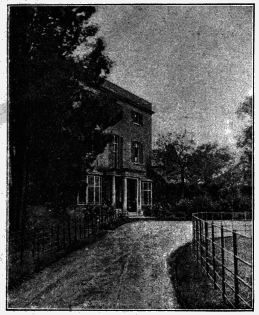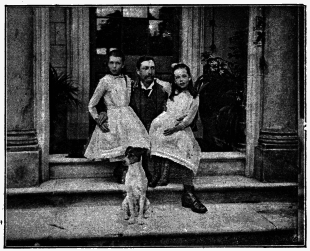
When the first three notices of the book appeared, wild dreams of a brilliant future beset me. They were all favourable notices—too favourable; but John Bull, The Press, and Bell's Messenger (I think they were the papers) scattered favourable notices indiscriminately at that time. Presently the Athen?um sobered me a little, but wound up with a kindly pat on the back, and the Saturday Review, then in its seventh number, drenched me with vitriolic acid, and brought me to a lower level altogether; and, finally, the Morning Herald blew a loud blast to my praise and glory—that last notice, I believe, having been written by my old friend Sir Edward Clarke, then a very young reviewer on the Herald staff, with no dreams of becoming Her Majesty's Solicitor-General just then! 'The House of Elmore' actually paid its publishers' expenses, and left a balance, and brought me in a little cheque; and thus my writing life began in sober earnest.
'DAWN'
By H. Rider Haggard

I THINK that it was in an article by a fellow-scribe, where, doubtless more in sorrow than in anger, that gentleman exposed the worthlessness of the productions of sundry of his brother authors, in which I read that whatever success I had met with as a writer of fiction was due to my literary friends and 'nepotic criticism.' This is scarcely the case, since when I began to write I do not think that I knew a single creature who had published books—blue books alone excepted. Nobody was ever more outside the ring, or less acquainted with the art of 'rolling logs,' than the humble individual who pens these lines. But the reader shall judge for himself.

To begin at the beginning: My very first attempt at imaginative writing was made while I was a boy at school. One of the masters promised a prize to that youth who should best describe on paper any incident, real or imaginary. I entered the lists, and selected the scene at an operation in a hospital as my subject. The fact that I had never seen an operation, nor crossed the doors of a hospital, did not deter me from this bold endeavour, which, however, was justified by its success. I was declared to have won in the competition, though, probably through the forgetfulness of the master, I remember that I never received the promised prize. My next literary effort, written in 1876, was an account of a Zulu war dance, which I witnessed when I was on the staff of the Governor of Natal. It was published in the Gentleman's Magazine, and very kindly noticed in various papers. A year later I wrote another article, entitled 'A Visit to the Chief Secocoeni,' which very nearly got me into trouble. I was then serving on the staff of Sir Theophilus Shepstone, and the article, signed with my initials, reached South Africa in its printed form shortly after the annexation of the Transvaal. Young men with a pen in their hands are proverbially indiscreet, and in this instance I was no exception. In the course of my article I had described the Transvaal Boer at home with a fidelity that should be avoided by members of a diplomatic mission, and had even gone the length of saying that most of the Dutch women were 'fat.' Needless to say, my remarks were translated into the Africander papers, and somewhat extensively read, especially by the ladies in question and their male relatives; nor did the editors of those papers forbear to comment on them in leading articles. Shortly afterwards, there was a great and stormy meeting of Boers at Pretoria. As matters began to look serious, somebody ventured among them to ascertain the exciting cause, and returned with the pleasing intelligence that they were all talking of what the Englishman had written about the physical proportions of their womenkind and domestic habits, and threatening to take up arms to avenge it. Of my feelings on learning this news I will not discourse, but they were uncomfortable, to say the least of it. Happily, in the end, the gathering broke up without bloodshed, but when the late Sir Bartle Frere came to Pretoria, some months afterwards, he administered to me a sound and well-deserved lecture on my indiscretion. I excused myself by saying that I had set down nothing which was not strictly true, and he replied to the effect that therein lay my fault. I quite agree with him; indeed, there is little doubt but that these bald statements of fact as to the stoutness of the Transvaal 'fraus,' and the lack of cleanliness in their homes, went near to precipitating a result that, as it chanced, was postponed for several years. Well, it is all done with now, and I take this opportunity of apologising to such of the ladies in question as may still be in the land of life.

This unfortunate experience cooled my literary ardour, yet, as it chanced, when some five years later I again took up my pen, it was in connection with African affairs. These pages are no place for politics, but I must allude to them in explanation. It will be remembered that the Transvaal was annexed by Great Britain in 1877. In 1881 the Boers rose in rebellion and administered several thrashings to our troops, whereon the Government of this country came suddenly to the conclusion that a wrong had been done to the victors, and, subject to some paper restrictions, gave them back their independence. As it chanced, at the time I was living on some African property belonging to me in the centre of the operations, and so disgusted was I, in common with thousands of others, at the turn which matters had taken, that I shook the dust of South Africa off my feet and returned to England. Now, the first impulse of an aggrieved Englishman is to write to the Times, and if I remember right I took this course, but, my letter not being inserted, I enlarged upon the idea and composed a book called 'Cetewayo and his White Neighbours.' This semi-political work, or rather history, was very carefully constructed from the records of some six years' experience, and by the help of a shelf full of blue books that stare me in the face as I write these words; and the fact that it still goes on selling seems to show that it has some value in the eyes of students of South African politics. But when I had written my book I was confronted by a difficulty which I had not anticipated, being utterly without experience in such affairs—that of finding somebody willing to publish it. I remember that I purchased a copy of the Athen?um, and selecting the names of various firms at hazard, wrote to them offering to submit my manuscript, but, strange to say, none of them seemed anxious to peruse it. At last—how I do not recollect—it came into the hands of Messrs. Trubner, who, after consideration, wrote to say that they were willing to bring it out on the half profit system, provided that I paid down fifty pounds towards the cost of production. I did not at all like the idea of parting with the fifty pounds, but I believed in my book, and was anxious to put my views on the Transvaal rebellion and other African questions before the world. So I consented to the terms, and in due course 'Cetewayo' was published in a neat green binding. Somewhat to my astonishment, it proved a success from a literary point of view. It was not largely purchased—indeed, that fifty pounds took several years on its return journey to my pocket, but it was favourably, and in some instances almost enthusiastically, reviewed, especially in the colonial papers.
5
This and succeeding illustrations are from photographs by Fradelle & Young.